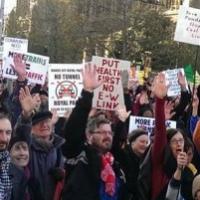
Labour claim opposition to project but refuse to rip up contracts
The campaign against the East-West toll road in Melbourne is growing. Following the successful rally of more than 3000 people at the end of June, it is now time to prepare for more picketing and direct action should the contracts be signed and construction begins.
At the high point of the June rally, protestors occupied the main intersection in Melbourne outside Flinders Street railway station. Socialist Party Yarra Councillor Stephen Jolly spoke about the profit motives driving the project and the need to build a movement for political change.
Socialist Party member Kat Galea also spoke as a participant in the picketing campaign. She spoke about how mass pressure has brought the campaign to where it is and further mobilisations will be required if we are to win.
Direct action is not just a tactic to annoy the government or get media attention. Hitting the companies involved in the profits is a key objective of the campaign.
For the past few months, the campaign has travelled around Victoria State, talking with people and residents’ groups not only about how destructive the East-West Link would be for the inner-north, but how much funding it would take away from other necessary infrastructure across the state.
From Mernda to Geelong, Belgrave to Ballarat, the verdict has been clear: people want investment in public transport, not a private toll road.
An important part of the campaign is exposing the Australian Labor Party opposition. The June rally demanded that Labor rip up any contracts signed if they come to power.
Labor is currently only offering fake opposition to the project. They say that ‘upsetting the financial markets’ is not a risk they are prepared to take, even if it means improving the lives of millions of Victorians.
Labor’s reluctance to make a move for power during a recent debacle in the State Parliament suggests they do not want to be in power if the East-West Link contracts have not already been signed.
Labor’s fake opposition
Coming to power would have exposed their fake opposition to the project, as they would have had been under immense pressure from their big business backers to go ahead with the project. It is much more convenient for them to hope to be elected in November after the contracts are signed, then they can claim their hands are tied.
Numerous speakers at the rally made clear that even if the contracts are signed before the election, none of the issues surrounding the project – environmental, economic and social – will have disappeared.
If Labor refuses to rip up the contracts they can expect the anger that exists to simply be directed towards them. We need to prepare people that mass community pickets will be required at the construction sites regardless of who is in power.
A comparable multi-billion dollar project in the US, the Alaskan Way Viaduct replacement tunnel in Seattle, has been fraught with technical, industrial and financial issues. There is a possibility that this project, which is well into construction, might never be completed.
While supportive elected politicians and legal manoeuvres can be useful auxiliaries, only mass action by working people can really effect meaningful change. The thousands of people who have taken part in the campaign, so far, have helped change public opinion and forced the government to announce a number of improvements to the public transport system.
With more people involved we can stop this toll road in its tracks and win mass investment in public transport which would benefit everyone.
Special financial appeal to all readers of socialistworld.net |
Support building alternative socialist media Socialistworld.net provides a unique analysis and perspective of world events. Socialistworld.net also plays a crucial role in building the struggle for socialism across all continents. Capitalism has failed! Assist us to build the fight-back and prepare for the stormy period of class struggles ahead. Please make a donation to help us reach more readers and to widen our socialist campaigning work across the world. |
Donate via Paypal |
| M | T | W | T | F | S | S |
|---|---|---|---|---|---|---|
| 1 | 2 | 3 | 4 | 5 | 6 | |
| 7 | 8 | 9 | 10 | 11 | 12 | 13 |
| 14 | 15 | 16 | 17 | 18 | 19 | 20 |
| 21 | 22 | 23 | 24 | 25 | 26 | 27 |
| 28 | 29 | 30 | 31 | |||


Be the first to comment